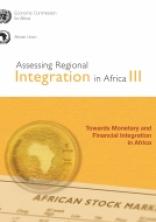Assessing Regional Integration in Africa III

Regional integration remains a viable strategy for Africa to achieve sustainable economic growth and development, reduce poverty and participate effectively in the globalization process. This vision is embodied in the Abuja Treaty Establishing the African Economic Community, and is re-emphasised in the Constitutive Act of the African Union. These blueprints include a roadmap for a monetary union and the harmonization and integration of financial systems and markets across the continent. Achievement of these goals requires a climate of macroeconomic stability, monetary and financial integration and effective trade and economic relations.
Monetary unification and financial integration overcome problems associated with multiple and non-convertible currencies and with underdeveloped capital and financial markets and would also propel the continent towards establishment of the envisioned African Monetary Union. Several Regional Economic Communities (RECs) have adopted common macroeconomic policy frameworks and convergence targets, underpinned by monetary and financial cooperation.
As follow-up to ARIA-II, ARIA-III focuses on gauging the performance of African RECs in the areas of macroeconomic convergence, monetary cooperation, and financial integration. The report finds that although there are some successes, African countries are still experiencing enormous difficulties in achieving the macroeconomic convergence criteria set by their RECs, such as targets on inflation, debt-to-GDP ratio, and deficit-to-GDP ratio. The assessment also indicates that despite some financial developments, African financial market activities remain shallow, with capital markets characterized by low capitalization and liquidity.
The report also provides policymakers with recommendations on how to deepen monetary and financial integration on the continent and create an enabling macroeconomic environment for the continent.